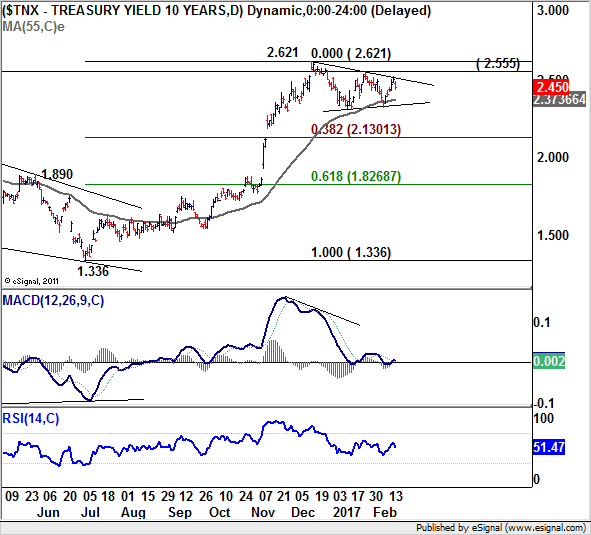The reversal in treasury yield dragged down the greenback again overnight. 10 year yield closed down -0.052 to 2.450 while 30 yield yield dropped -0040 to close at 3.051. The dollar index is now back at 100.50 after hitting as high as 101.76 earlier this week. Dollar is now trading as the third weakest major currency. The Japanese yen remains the weakest one on strong risk appetite. New Zealand dollar followed after weaker than expected economic data. On the other hand, Swiss Franc is the strongest major currency this week, partly due to political uncertainties in Eurozone and UK. In other markets, Gold rides on renewed weakness in dollar and is back pressing 1240. WTI crude oil is extending recent sideway trading.
Treasury yield to drag down dollar in near term
10 year yield's rebound was limited below 2.555 resistance and reversed. The development indicates that consolidation pattern from 2.621 is extending with another falling leg. Deeper decline would be seen back to 55 day EMA (now at 2.373). Such consolidation is seen as a triangle pattern. Hence, firstly, downside would be contained around 55 days EMA and bring rebound. More importantly, it's now possibly in the last leg and up trend from 1.336 is ready to resume soon. Break of 2.555 will indicate that it's finally breaking out. Development in yield would likely drag dollar in near term before sending it higher later.

ECB minutes suggest no hurry to exit stimulus
ECB minutes for the January meeting unveiled that policymakers were in no hurry to reduce stimulus. Indeed, to facilitate the asset purchase measures, the central bank signaled willingness to deviate from the capital key policy. As noted in the minutes, "there was some room for a trade-off between relative deviations from the capital key across jurisdictions and limiting the extent of purchases below the DFR... This baseline approach could be reconsidered by the Governing Council should undue market effects materialize". Originally, the purchases are based on the amount of capital each country has paid into the ECB. Recent improvement in inflation should not alter ECB stance. Policymakers acknowledged that "the recent increases in energy prices had thus far not translated into indirect or second-round effects on broader inflation... This suggested second-round effects would unfold rather slowly".
On the data front, New Zealand business NZ manufacturing index dropped to 51.6 in January. Retail sales rose 0.8% yoy in Q4. Eurozone current account and UK retail sales are the main feature in European session. US will release leading indicator later in the day.
